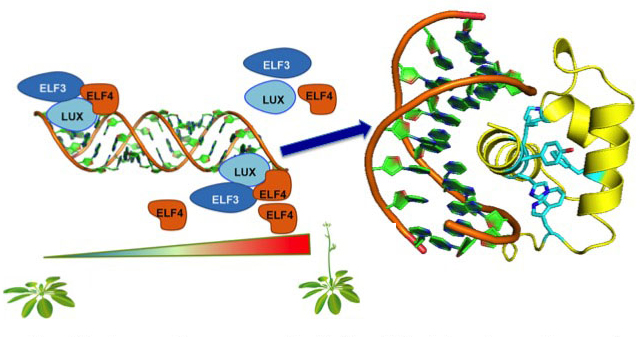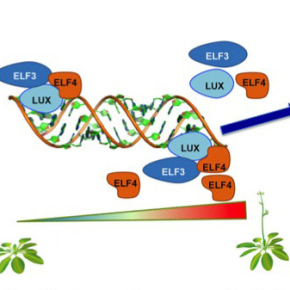
“Thermometer” protein regulates blooming
As average temperatures rise every year, it is no longer rare to see plants flower as early as February. Behind this phenomenon is a complex of proteins whose activity is controlled by temperature changes, as has just been demonstrated by researchers from the Cell and Plant Physiology Laboratory (CNRS / CEA / INRAE / Université Grenoble Alpes) and their partners.1 Composed of three proteins (LUX, ELF3, and ELF4), the Evening Complex regulates the expression of genes involved in plant growth and flowering, as a function of exterior temperatures. The research team has shown, in vitro, that while all three proteins are needed for the complex to function correctly, ELF3 is the only one whose activity directly depends on temperature. When the temperature increases, ELF3 prevents the complex from binding to DNA and repressing plant growth genes. Consequently, growth proceeds. A study of the structure of LUX nonetheless demonstrated that certain mutations could alter plant sensitivity to temperature. These findings are published in PNAS (12 March 2020).

EC acts like a temperature sensor. At low temperatures, it prevents the expression of growth genes by binding to the DNA. When temperatures are high enough, it separates from the DNA, permitting gene expression and subsequent plant flowering.
© Silva et al. / PNAS
- 1Scientists from the following institutions participated in this study: the European Synchrotron Radiation Facility (Grenoble); Sungkyunkwan University (South Korea); the Centro Nacional de Biotecnología, Consejo Superior de Investigaciones Científicas (Spain); the National Institute of Science Education and Research (India); and the Institut für Gemüse- und Zierpflanzenbau (Germany).
Molecular mechanisms of Evening Complex activity in Arabidopsis. Catarina S. Silva, Aditya Nayak, Xuelei Lai, Stephanie Hutin, Véronique Hugouvieux, Jae-Hoon Jung, Irene López-Vidriero, Jose M. Franco-Zorrilla, Kishore C. S. Panigrahi, Max H. Nanao, Philip A. Wigge, and Chloé Zubieta. PNAS, 12 March 2020. DOI:10.1073/pnas.1920972117


